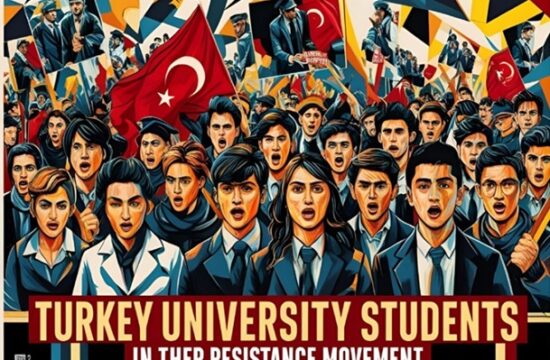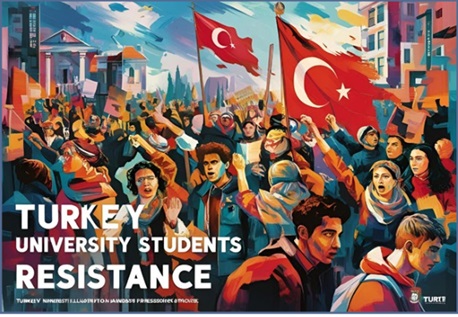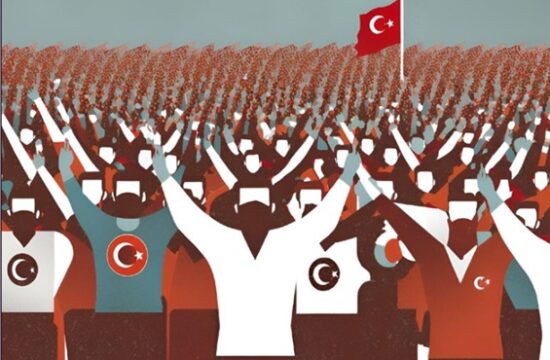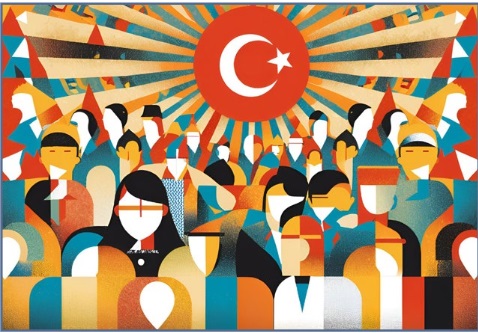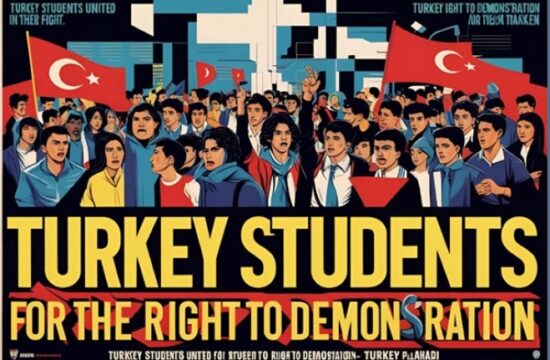Team Resist ODTU
Middle East Technical University
picture source: Created with AI
Lately there have been many actions, protests and demonstrations both nationally and internationally. The people began to express their anger, their grievances and the injustices they had suffered over the years with the strength and motivation they received from each other. But what about Turkey, which started the protests later compared to other countries?
What are the March 19 protests?
The consequences of the economic crisis that Turkey has been suffering since the decade of 2010s, decisions eroding the trust in the judicial system, repressive measures against the media, the earthquake catastrophe of February 6, 2023, the social tension caused by the refugee crisis and the government’s indifference to all these factors have contributed to the growing anger of public opinion against the government. The government’s anti-democratic repression through unjust and abusive policies imposed on the people by undemocratic means has not diminished; on the contrary, it has reached its peak with the successive arrests of opposition politicians.
Having reached this point, seeing that it was no longer possible to criticize the government, or if it was, the ones who criticized were silenced or arrested, people began to despair and saw no other option but to wait.
Of course, in such a period, even if people were desperate, the question that had been on their lips for years, “What more do we need to take to the streets and demand our rights?” was increasingly being asked. The answer to this question finally came with the arrest of Ekrem İmamoğlu in the early hours of March 19, 2025. This was the last straw for the Turkish people.
t wasn’t about “him”, ‘her’, or “that”, it wasn’t just about one person. It seemed that people no longer had security of life, property or titles. All this was a sign that the government would do everything in its power to make democracy, human rights, security, etc.- which were already considered to beobsolete-no longer exist in any form, not even for the sake of appearances. The first reaction to this obvious signal came from the students of Istanbul University.
On that day, Istanbul University students demonstrated against this illegal behavior, overcame police barricades and gave hope to society. This justified movement created a breaking point in the country and encouraged the people to take to the streets on the same day, led by the students.
As a result, protests broke out across the country, especially in Istanbul, Ankara and Izmir, which were spurred by the arrest warrant issued against İmamoğlu on the night of March 23.
To summarize, the protests were not limited to an ideology, but actually represented a common quest for justice arising from different lives and points of view. The demand for “right, law and justice” became the common roof of a pent-up anger for years. The government’s misguided policies, its deliberate illegality and its indifference to the most important issues had become a threat not only to the opposition, but also to the existence and future of society and the country as a whole. As a result, the repression, which had become unbearable, was enough to mobilize the broad masses of the population, especially the students.
Students in the
March 19 Protests
With suspicions that a fiduciary would be appointed to the IBB (Istanbul Metropolitan Municipality), the public gathered in Saraçhane at the call of the CHP (Republican People’s Party); vigils began and the majority of the crowd consisted of students. During the protests that spread across the country, the police violence was not broadcast on television, but through students‘ postings on social media. The leader of CHP, Özgür Özel, addressed the mainstream media with a call for a boycott; the public initiated indefinite boycotts against pro-government companies. These boycotts were also organized and spread thanks to the students. In other words, students have become not only protesters, but also the organ of dissemination of these protests.
Another issue is that the Atatürk youth, who formed the backbone of the protests and headed them, have disproved the expressions such as “insensitive Generation Z” or “kanzi” invented by the government supporters with the determined stance they have shown. Indeed, most of these young people, who have never seen any regime other than the AKP from the moment they were born, have become the guardians of the republican revolution after years of propaganda and brainwashing, are putting the government through the most difficult days of the last 23 years with the March 19 protests. In response to this, the government’s increased unlawfulness, repression and arrest orders reveal the difficult situation in which it finds itself. Who knows, perhaps the March 19 protests are the beginning of the end.
On the other hand, it is clear that the protests started with the demand for “Justice for İmamoğlu”, but they were not limited to this demand, but, on the contrary, turned into a quest for rights for everything that has been building up for years. The issue is no longer “just a few trees” or “just a few politicians”. These protests are the rebellion of Generation Z, the only generation that is poorer than the preceding one since the establishment of the Republic, against injustice and the absence of law.
As they fight for right, law and justice, for the future of their country and for their futures, for a brighter tomorrow, we see them on the streets demanding accountability, confronting the mainstream media and striving to raise public awareness — and we will continue to
see them.
What about ODTU?
The Middle East Technical University (ODTU in its Turkish abbreviation) stands out not only for its academic success, but also for its sensitivity to social events and its historically activist identity. ODTU, which is one of the first institutions that come to mind when one speaks of student movements in Turkey, has been one of the pioneers of student opposition with its tradition of political awareness and organization.
During the March 19 protests, ODTU students along with university components continued this tradition by expressing their just and democratic opinions with peaceful protests. Forums organized on campus, informationalposters placed around the campus, solidarity actions and mass marches demonstrate that ODTU’s political reflex is not just an emotional reaction, but is based on a conscious and responsible foundation.
In the course of this process, not only students, but also faculty members and former students acted within the frame- work of ODTU’s historical responsibility. The solidarity network within the campus has expanded; this collective stance shaped around the issues of academic freedom, freedom of expression and social justice has highlighted the existence of a student movement that has placed itself on the national agenda.
ODTU’s activist culture is not only a way to react; it is also an effort to in- form the public and create an alternative. Such a culture manifests not only the students‘ defense of their individual ideologies, but also their commitment to the struggle for a more just and free society. What happened at ODTU during the March 19 protests can be seen as a modern-day reflection of this ancient tradition.
International Student Solidarity
The spark ignited at ODTU, ITU (Istanbul polytechnic University) and IU (Istanbul University) soon spread to the campuses of other universities, to the streets and homes; the fire of youth resistance spread wave after wave. Furthermore, this common voice was recognized not only within the borders of the country, but also on an international scale.
Not only in Turkey, but also in the world, voices are raised against injustice, illegality and the absence of law. Students all over the world are uniting and acting with a common conscience. Therefore, for the world of tomorrow, the creation of international solidarity networks that can carry the voice of students beyond borders is no longer a dream, but a necessity.




